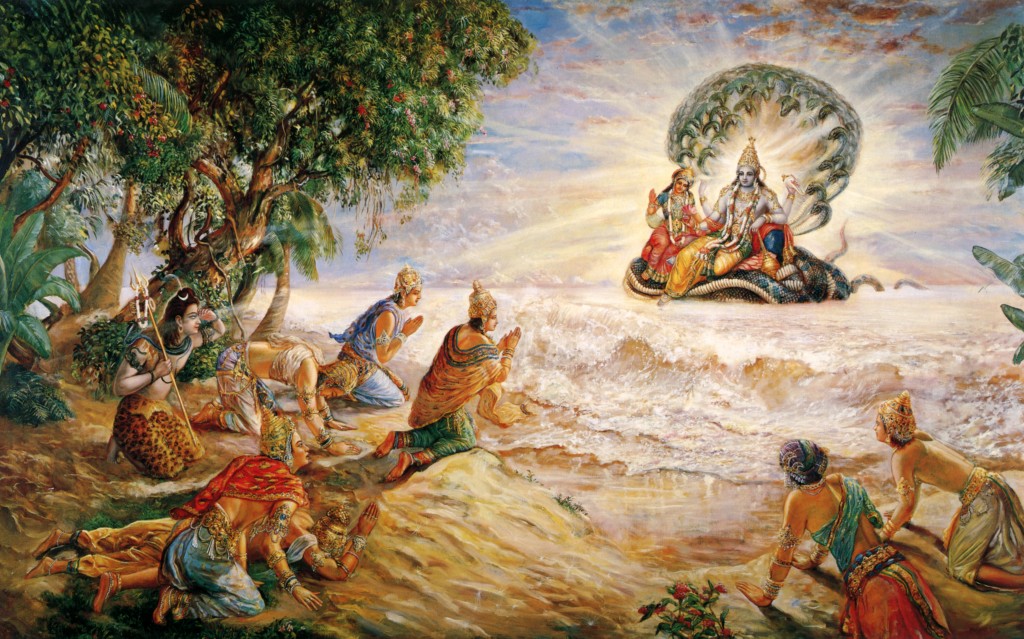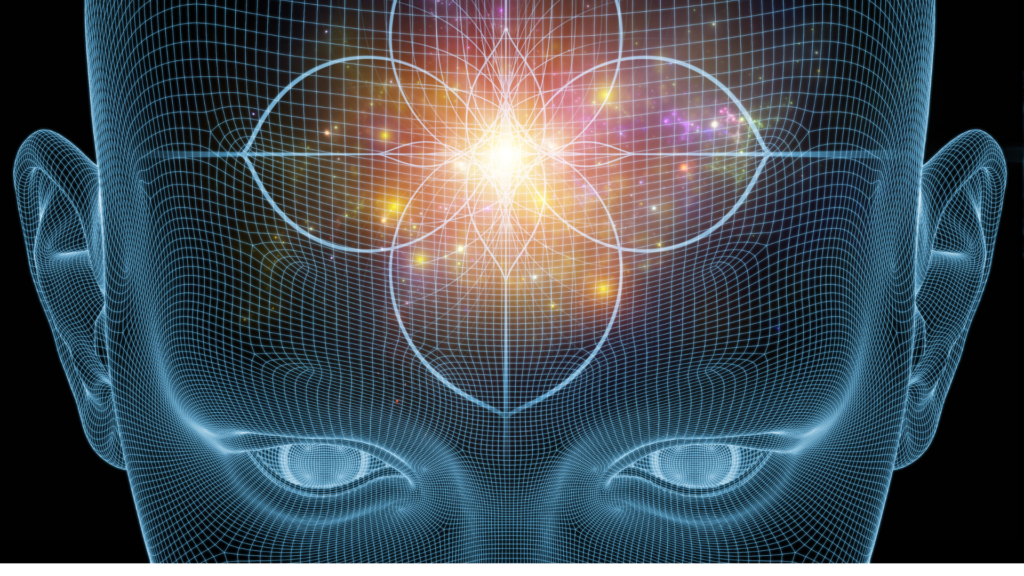Acknowledgement.
School of Yoga is profoundly grateful to Saṃskṛta scholars and academics Pijus Kanti Pal (pal.pijuskanti@gmail.com) and Dolon Chanpa Mondal for their support in Saṃskṛta transliteration and quality control.
School of Yoga explains Śrīmad-bhagavad-gītā, chapter 12, bhakti-yoga.
Introduction – bhakti-yoga is a yoga method where the identity of Self is transferred to a deity or role model such as a Guru.
Some terms that need to be understood.
- Śraddhā: Śraddhā is a combination of intent, dedication, patience, sincerity, enterprise, focus and effort. It is quality of input into any activity and is not dependent on capability. Also, it is also not dependent of outcome or result.
- Consequently, a person may not have the requisite capability or be successful in a particular activity, but because of śraddhā, his success is considered as assured.
- Renunciation of action (karma-tyāga) – here the practitioner sacrifices his or her action to the owner of sacrifice (Śrī Kṛṣṇa). A sacrifice into sacrifice nullifies all action because it is akin to adding null to null, which is null.
कर्मात्मनां च देवानां सोऽसृजत् प्राणिनां प्रभुः ।
साध्यानां च गणं सूक्ष्मं यज्ञं चैव सनातनम् ॥ २२ ॥
karmātmanāṃ ca devānāṃ so’sṛjat prāṇināṃ prabhuḥ |
sādhyānāṃ ca gaṇaṃ sūkṣmaṃ yajñaṃ caiva sanātanam || 22 ||
For the sake of living being’s intent upon action, he created the eternal sacrifice; as also the host of Gods and the subtle multitude of the lesser divinities, the sādhyas (22)
Arjuna said: Which is better? Worshiping you or the imperishable Brahman?
Śrī Kṛṣṇa said: Those that worship me with sincerity and devotion (śraddhā), I consider perfect in Yoga, but even those that worship the Brahman – living with restrained senses, even in their dealings and working for the welfare of all, they too come to me. The problem of worshipping the Brahman is that it is very difficult to visualise and focus on the unmanifest.
- However, by renouncing all actions into me and regarding me as the supreme goal is easier.
- So, focus on me as the supreme goal and I will deliver you from the cycle of Fix your consciousness on me and make me the source of your intellect. Thereafter, you will live in me.
- If you are unable to steadily focus your awareness on me, then reach me with abhyāsa-yoga (Yoga of rigorous practice). In case you are unable to practice abhyāsa-yoga, sacrifice the intent of your actions to me. If you are unable to do even that, just renounce the fruit of your action to me and attain perfection.
- Verse 12 – This is an important verse where Śrī Kṛṣṇa explain the meditation process with a solution. Wisdom of the Self (jñāna) is better than practice of surrender to the deity (iṣṭa-deiva), in this case Śrī Kṛṣṇa (abhyāsa). In the process of acquisition of wisdom (jñāna) meditation (dhyāna) ensures success. However, during meditation, when a person practices renunciation of the fruits of action (karma-phala-tyāga), there is immediate peace. This quickens the process of achieving perfection.
- In the above verse, Śrī Kṛṣṇa is suggesting a hybrid solution where one element from one path acts as a catalyst to another path. This is a method which can be seen throughout Śrīmad-bhagavad-gītā. Śrī Kṛṣṇa is not a purist, but a pragmatist who tries to increase the number of options by suggesting solutions that fit individual capability and capacity.
School of Yoga explains Śrīmad-bhagavad-gītā, chapter 12, bhakti-yoga, verse 13 to 19.
Śrī Kṛṣṇa explains the qualities of the bhakti-yogī.
- Hating none, friendly and compassionate; with no feeling of being the doer (nirahaṅkāra), content in whatever comes and living without expectations (santoṣa); steady in yoga, with cognition (manas) and intelligence (buddhi) under control the practitioner becomes dear to me.
- Dear to me is also one who does not get agitated at the world or does not spread agitation; who is free from exuberance, envy, fear or anxiety. Also, dear is also one who has no expectations, is pure, dextrous, untroubled, without ambition and renounces all undertaking. He who neither rejoices nor rejects, grieves or desires, renounces superstition and devoted to me is dear to me.
- He who treats friend and foe alike, also honour or dishonour, heat or cold, pleasure or pain and is free from attachment; to whom praise or censure is the same, content with anything, homeless and steady in mind, he is dear to me. Practitioners who practice this conditioning with sincerity and devotion are dear to me.
Śrīmad-bhāgavad-purāṇa propounds nine primary tools of bhakti.
- Śravana (listening to achievements of the deity) – practitioners view the deity as a role model, analyse the deity’s life and try to emulate those qualities in their own life.
- Kīrtana (praising the achievements of the deity) – practitioner examines the mythological life in great detail and understand the qualities of their deity. This leads to them being able to extol and emulate their favourite deity (iṣṭa-deva).
- Smaraṇa (retaining an image of the deity at all time) – practitioners try to retain the deity in an external form in pictures and then internalise it.
- Pada-sevana (pada = feet + sevana = service) – means service at the feet. Since bhakti can also be to a living entity like a Guru, country or system like Yoga, service before Self becomes a critical experiential exercise in subduing the Self.
- Suracanā (worshipping the deity with hyperbole) – When a practitioner extols using hyperbole, there is natural desire to reach for the same outcomes. A vision is created for oneself and effort gets aligned to those goals. Also, such prayers keep the deity at a high position, thus motivating one to surrender one’s Self.
- Vandanā (worshipping the deity) – integration of the self with the deity.
- Dāsya (servitude) – negating the sense of Self by serving as a servant.
- Sākhya (retaining a base of friendship) – Maintaining company of like-minded individuals allows the yogi to stay integrated with the deity 24 x 7.
- Ātmanivedana (ātma = soul + nivedana = state of no schism) or state where there is no difference between the yogi and the deity. This is achieved when the practitioner practices all the above steps and constantly views him or herself as an extension of the deity.

Example of bhakti-yoga.
At the end of the Rāmāyana, Hanumān returned to Ayodhyā with Rāma, now the king. One day, while Rāma was performing a sacrifice, a relative shot a bird which fell into the sacrificial fire, defiling it. An angry Rāma, ordered that the miscreant be put to death. The terrified relative surrendered to Hanumān and sought shelter. When Hanumān refused to surrender the relative, stating that rules of dharma required that he protect anyone who surrendered to him, Rāma challenged him to a duel. At the appointed hour, Hanumān took the relative to the site of the duel, encircled him with his tail and sitting on top of the hive like structure, went into samādhi. When Rāma came out and saw Hanumān, he prepared for battle. Knowing the quality of Hanumān’s chivalry, Rāma sent his most powerful missile – the Rāma-bana, instructing it to destroy Hanumān. The missile went towards Hanumān, circled him and returned to Rāma without doing anything. A perplexed Rāma kept shooting the missile with no change in result. When he meditated on why the missile was malfunctioning, he intuited that the missile was unable to find Hanumān, there was only Rāma!
Hanumān has subsumed his identity into Rāma, this is the highest form of bhakti-yoga-samādhi.
School of Yoga explains Śrīmad-bhagavad-gītā, chapter 12, bhakti-yoga.
Some contradictions to accepted positions.
- There is considerable difference between bhakti-yoga and religion as practiced in the Abrahamic tradition.
- In religion, the individual accepts a subordinate position to that of a deity, there is supplication of the devotee to the deity. However, since the person does not lose his or her identity and remains separated from the deity there is a subtle filter between the practitioner and deity which hinders complete merger with the deity.
- In Yoga, the deity is assumed to be a role model but equal in Identity. So, there is no supplication. There is only surrender. This means that the Yogi does everything to transfer his or her sense of identity on to the target identity (deity).
- When the practitioner applies Śrī Kṛṣṇa’s bhakti-yoga advise to the target, then the person’s identity slowly gets subsumed into the target Identity.
- When this happens, the person’s puruṣa becomes zero, this brings prakṛti to nirguṇa state, resulting in merger with
- So, we can see that when a person surrenders completely and subsumes his or her identity with the target entity, the merger with the deity actually results in a merger with
- So, bhakti-yoga is not confined to Śrī Kṛṣṇa It can be to any deity, Guru or teacher, subject, thought, country or even task.
School of Yoga explains Śrīmad-bhagavad-gītā, chapter 12, bhakti-yoga.
Lessons learned in Chapter 12.
- Śrī Kṛṣṇa is a manifestable state that controls creation and maintenance but does not participate in the operations.
- From the description of Arjuna’s vision, one can conclude that birth, living and death is brutal and without sentiment.
The Transliteration of Śrīmad-bhagavad-gītā, chapter 12 follows,
The Sanskrit words are in red italics.
अर्जुन उवाच –
एवं सततयुक्ता ये भक्तास्त्वां पर्युपासते ।
ये चाप्यक्षरमव्यक्तं तेषां के योगवित्तमाः ॥ १२-१॥
Arjuna said (1) Between those that worship you and those that worship the imperishable, unmanifested Brahman, who is likely to succeed (evaṃ satatayuktā ye bhaktāstvāṃ paryupāsate । ye cāpyakṣaramavyaktaṃ teṣāṃ ke yogavittamāḥ ॥ 12-1॥).
श्रीभगवानुवाच –
मय्यावेश्य मनो ये मां नित्ययुक्ता उपासते ।
श्रद्धया परयोपेताः ते मे युक्ततमा मताः ॥ १२-२॥
ये त्वक्षरमनिर्देश्यमव्यक्तं पर्युपासते ।
सर्वत्रगमचिन्त्यञ्च कूटस्थमचलन्ध्रुवम् ॥ १२-३॥
सन्नियम्येन्द्रियग्रामं सर्वत्र समबुद्धयः ।
ते प्राप्नुवन्ति मामेव सर्वभूतहिते रताः ॥ १२-४॥
Śrī Kṛṣṇa said (2-4) Those that fix their cognition on me with steadfast focus and serve me with dedication and sincerity, these are endowed with qualities to become realised souls, in my opinion (mayyāveśya mano ye māṃ nityayuktā upāsate । śraddhayā parayopetāḥ te me yuktatamā matāḥ ॥ 12-2॥). Those who worship the indestructible, indefinable, omnipresent, unthinkable, immovable, eternal (ye tvakṣaramanirdeśyamavyaktaṃ paryupāsate । sarvatragamacintyañca kūṭasthamacalandhruvam ॥ 12-3॥). Having restrained the multitude of senses, even minded everywhere, they obtain me only, those that rejoice in the welfare of all creation (sanniyamyendriyagrāmaṃ sarvatra samabuddhayaḥ । te prāpnuvanti māmeva sarvabhūtahite ratāḥ ॥ 12-4॥).
क्लेशोऽधिकतरस्तेषामव्यक्तासक्तचेतसाम् ।
अव्यक्ता हि गतिर्दुःखं देहवद्भिरवाप्यते ॥ १२-५॥
ये तु सर्वाणि कर्माणि मयि संन्यस्य मत्पराः ।
अनन्येनैव योगेन मां ध्यायन्त उपासते ॥ १२-६॥
(5-6) The struggle is greater for those whose consciousness is focused on the indistinct unmanifested Brahman as a goal, it is a painful journey for the embodied (kleśo’dhikatarasteṣāmavyaktāsaktacetasām । avyaktā hi gatirduḥkhaṃ dehavadbhiravāpyate ॥ 12-5॥). But those that renounce all actions to me, regard me as the supreme goal, meditation in calmness with undistracted union (ye tu sarvāṇi karmāṇi mayi saṃnyasya matparāḥ । ananyenaiva yogena māṃ dhyāyanta upāsate ॥ 12-6॥).
तेषामहं समुद्धर्ता मृत्युसंसारसागरात् ।
भवामि नचिरात्पार्थ मय्यावेशितचेतसाम् ॥ १२-७॥
मय्येव मन आधत्स्व मयि बुद्धिं निवेशय ।
निवसिष्यसि मय्येव अत ऊर्ध्वं न संशयः ॥ १२-८॥
(7-8) For those with a focussed consciousness I am the navigator who ultimately brings them out of the sea of cycle of rebirth (teṣāmahaṃ samuddhartā mṛtyusaṃsārasāgarāt । bhavāmi nacirātpārtha mayyāveśitacetasām ॥ 12-7॥). Fix your cognition on me only, let your intellect be placed on me, you will live in me alone hereafter, without doubt (mayyeva mana ādhatsva mayi buddhiṃ niveśaya । nivasiṣyasi mayyeva ata ūrdhvaṃ na saṃśayaḥ ॥ 12-8॥).
अथ चित्तं समाधातुं न शक्नोषि मयि स्थिरम् ।
अभ्यासयोगेन ततो मामिच्छाप्तुं धनञ्जय ॥ १२-९॥
अभ्यासेऽप्यसमर्थोऽसि मत्कर्मपरमो भव ।
मदर्थमपि कर्माणि कुर्वन्सिद्धिमवाप्स्यसि ॥ १२-१०॥
(9-10) If you are unable to fix the consciousness steadily on me by practice of Yoga, then wish to reach me (atha cittaṃ samādhātuṃ na śaknoṣi mayi sthiram । abhyāsayogena tato māmicchāptuṃ dhanañjaya ॥ 12-9॥). If also by practice you are unable, then let the focus of your actions, also action be for my sake and in this process, you will attain perfection (abhyāse’pyasamartho’si matkarmaparamo bhava । madarthamapi karmāṇi kurvansiddhimavāpsyasi ॥ 12-10॥).
अथैतदप्यशक्तोऽसि कर्तुं मद्योगमाश्रितः ।
सर्वकर्मफलत्यागं ततः कुरु यतात्मवान् ॥ १२-११॥
श्रेयो हि ज्ञानमभ्यासाज्ज्ञानाद्ध्यानं विशिष्यते ।
ध्यानात्कर्मफलत्यागस्त्यागाच्छान्तिरनन्तरम् ॥ १२-१२॥
(11-12) If you are unable to do even this, take refuge in my Yoga by renouncing all the fruits of your action with a self-restrained Soul (athaitadapyaśakto’si kartuṃ madyogamāśritaḥ । sarvakarmaphalatyāgaṃ tataḥ kuru yatātmavān ॥ 12-11॥). Indeed, wisdom of the Self is better than practice, in wisdom meditation excels, in meditation renunciation of the fruits of action, in renunciation there is immediate peace (śreyo hi jñānamabhyāsājjñānāddhyānaṃ viśiṣyate । dhyānātkarmaphalatyāgastyāgācchāntiranantaram ॥ 12-12॥).
अद्वेष्टा सर्वभूतानां मैत्रः करुण एव च ।
निर्ममो निरहङ्कारः समदुःखसुखः क्षमी ॥ १२-१३॥
सन्तुष्टः सततं योगी यतात्मा दृढनिश्चयः ।
मय्यर्पितमनोबुद्धिर्यो मद्भक्तः स मे प्रियः ॥ १२-१४॥
(13-14) Without rejecting any of creation, friendly, kind, and also without the feeling of the Self, without feeling of being the doer, same in adversity and gain. (adveṣṭā sarvabhūtānāṃ maitraḥ karuṇa eva ca । nirmamo nirahaṅkāraḥ samaduḥkhasukhaḥ kṣamī ॥ 12-13॥). Always content, the yogī is self-restrained, having firm conviction, who offers cognition and logic to me, this devotee is dear to me (santuṣṭaḥ satataṃ yogī yatātmā dṛḍhaniścayaḥ । mayyarpitamanobuddhiryo madbhaktaḥ sa me priyaḥ ॥ 12-14॥).
यस्मान्नोद्विजते लोको लोकान्नोद्विजते च यः ।
हर्षामर्षभयोद्वेगैर्मुक्तो यः स च मे प्रियः ॥ १२-१५॥
अनपेक्षः शुचिर्दक्ष उदासीनो गतव्यथः ।
सर्वारम्भपरित्यागी यो मद्भक्तः स मे प्रियः ॥ १२-१६॥
(15-16) He who is not agitated by the world and who does not agitate the world and who is free from joy, impatience, fear and agitation, he is dear to me (yasmānnodvijate loko lokānnodvijate ca yaḥ । harṣāmarṣabhayodvegairmukto yaḥ sa ca me priyaḥ ॥ 12-15॥). One is free from need, clean, diligent, unconcerned, who has renounced all new ventures, such a devotee is dear to me (anapekṣaḥ śucirdakṣa udāsīno gatavyathaḥ । sarvārambhaparityāgī yo madbhaktaḥ sa me priyaḥ ॥ 12-16॥).
यो न हृष्यति न द्वेष्टि न शोचति न काङ्क्षति ।
शुभाशुभपरित्यागी भक्तिमान्यः स मे प्रियः ॥ १२-१७॥
समः शत्रौ च मित्रे च तथा मानापमानयोः ।
शीतोष्णसुखदुःखेषु समः सङ्गविवर्जितः ॥ १२-१८॥
(17-18) He who neither rejoices nor rejects, does not grieve nor hankers, who has renounced auspicious and inauspicious, he who is completely devoted to me is dear to me (yo na hṛṣyati na dveṣṭi na śocati na kāṅkṣati । śubhāśubhaparityāgī bhaktimānyaḥ sa me priyaḥ ॥ 12-17॥). He who treats friend and foe alike and is the same when respected or insulted, in cold or heat, same in happiness or sadness and free from attachment (samaḥ śatrau ca mitre ca tathā mānāpamānayoḥ । śītoṣṇasukhaduḥkheṣu samaḥ saṅgavivarjitaḥ ॥ 12-18॥).
तुल्यनिन्दास्तुतिर्मौनी सन्तुष्टो येन केनचित् ।
अनिकेतः स्थिरमतिर्भक्तिमान्मे प्रियो नरः ॥ १२-१९॥
ये तु धर्म्यामृतमिदं यथोक्तं पर्युपासते ।
श्रद्दधाना मत्परमा भक्तास्तेऽतीव मे प्रियाः ॥ १२-२०॥
(19-20) Who is modulated in praise or criticism, silent, content in all situations, homeless, steadfast in devotion to me, that human is dear to me (tulyanindāstutirmaunī santuṣṭo yena kenacit । aniketaḥ sthiramatirbhaktimānme priyo naraḥ ॥ 12-19॥). Whoever devotee follows this immortal dharma as declared here, with sincerity and dedication regarding me as supreme, they are exceedingly dear to me (ye tu dharmyāmṛtamidaṃ yathoktaṃ paryupāsate । śraddadhānā matparamā bhaktāste’tīva me priyāḥ ॥ 12-20॥).


